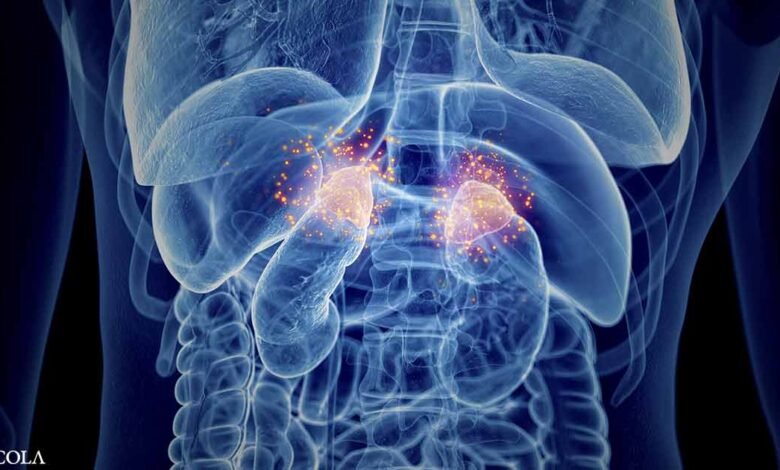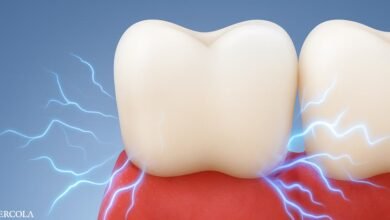
The adrenal glands, which sit above your kidneys, are responsible for producing stress hormones that help regulate metabolism, blood pressure, and your body’s stress response. But when these hormones become imbalanced, your energy tanks. You feel wired and tired at the same time, experiencing symptoms like fatigue, body aches, and nervousness.
Some would refer to this as “adrenal fatigue” — however, there are experts who say there’s no evidence backing up the existence of this condition. Let’s take a closer look to find out what truly causes adrenal fatigue — and how to ward off its symptoms.
What Is Adrenal Fatigue?
The adrenal glands are two triangular-shaped endocrine glands found on top of your kidneys. They are responsible for producing more than 50 hormones, including cortisol, adrenaline, and aldosterone. These adrenal hormones primarily regulate your physical and mental stress responses. They influence your metabolism, mood, immune function, and blood pressure. An article by LifeWorks Wellness Center explains:
“The adrenal glands help the body deal with any kind of stress — from emotional stress, to financial problems, to physical threats and relationship problems. They also play a major role in the body’s response to danger — the ‘fight or flight’ response which mobilizes the body’s resources to react to threat.”1
• Adrenal fatigue is said to occur when there’s too much stress — Excessive chronic stress “overstimulates” the adrenal glands, causing them to slow down. This could refer to physical, mental, or emotional stress. When the adrenal glands can no longer mount an adequate response, it’s referred to as adrenal fatigue.2
• What are the reported symptoms of adrenal fatigue? Tiredness or exhaustion is the primary symptom associated with this condition. Other symptoms vary, such as food cravings, difficulty recovering from sickness, foggy thinking, and having a hard time getting out of bed in the morning.3
• However, adrenal fatigue is not recognized as a legitimate medical condition — While the symptoms are all real, there is no solid scientific evidence to back up this theory.4 Dr. Raj Dasgupta, chief medical advisor for Garage Gym Reviews, explains:
“Adrenal fatigue is a term inappropriately used to explain feeling constantly tired, stressed, or burnt out. Adrenal fatigue is not a real medical diagnosis and multiple studies have shown that adrenal fatigue is not a medical condition. The adrenal glands don’t ‘wear out’ the way this theory suggests, and there is no scientific evidence to back it up.”5
A 2016 systematic review published in the journal BMC Endocrine Disorders that looked at 58 studies also found no evidence that adrenal impairment causes fatigue, dubbing this condition “a myth.”6
• There may be a different underlying cause for your symptoms — According to The Hearty Soul, “These symptoms could be caused by many other conditions. Instead of adrenal fatigue, other issues such as thyroid imbalances or iron deficiency could be the underlying cause of these symptoms. Lacking necessary nutrients in your diet may also contribute to persistent tiredness and related health concerns.”7
Don’t Confuse Adrenal Insufficiency with Adrenal Fatigue
One common assumption with adrenal fatigue is that it has something to do with having low cortisol (dubbed as “the stress hormone”). However, this is not an accurate term or concept.
• Cortisol testing does not accurately determine adrenal function — Cortisol is frequently checked through blood tests, but what’s being measured is your total cortisol, which includes both free and bound cortisol. Since most cortisol in your body is bound to proteins and inactive, “high cortisol” levels in blood tests may not be informative. Hence, while blood tests are able to assess many bodily systems, they do not provide a clear picture of adrenal function.
• Adrenal insufficiency is not the same as adrenal fatigue — Adrenal insufficiency is what’s called Addison’s disease. Unlike adrenal fatigue, this is a recognized medical condition that occurs when your body doesn’t make enough cortisol. Learn more about it in this article, “Comprehensive Treatment Options for Addison’s Disease.”
• Addison’s disease is rare but life-threatening — It requires proper treatment and management through hormone replacement therapy, and if not addressed can lead to shock, seizures, and even death. According to Georgi Dinkov, an expert on bioenergetic medicine, “If you have adrenal failure, unless you take cortisol shots you will die from hypoglycemia or Addison’s disease. So, it’s lethal.”
• Unlike adrenal fatigue, there’s a test that can accurately determine Addison’s disease — An adrenocorticotropic hormone (ACTH) test is used to check for problems with your adrenal glands. This test only recognizes extreme underproduction or overproduction of hormone levels, and does not work to check if your adrenal glands are overwhelmed by stress.
‘Adrenal Fatigue’ Could Actually Be a Dysfunction in Your HPA Axis
The fact is that chronic stress alone cannot cause your adrenal glands to stop working. Rather, when adrenal function changes, what’s really going on has to do with the signaling or communication mechanism between your brain and your adrenal glands in response to this chronic stress — not with adrenal gland function alone.
• This signaling system is called the hypothalamic-pituitary-adrenal (HPA) axis — This is your body’s primary stress response system, and is composed of the adrenal glands and the hypothalamus and pituitary glands in your brain. It works by facilitating the release of hormones into your glands to regulate stress responses. One study notes:8
“The HPA axis, the autonomic nervous system (ANS), and the immune system are not systems working apart from each other: they interact extensively in harmonizing the hormonal and inflammatory stress response.”
• Chronic stress keeps your HPA axis stuck in overdrive — The HPA axis is essential for regulating cortisol levels, and when you are stressed, your HPA axis is chronically activated, leading to elevated cortisol levels. When this happens consistently, even low-level but chronic stress will trigger fatigue, anxiety, inflammation, and binge-eating — symptoms commonly attributed to adrenal fatigue. According to an article in Harvard Health:
“Persistent epinephrine [adrenaline] surges can damage blood vessels and arteries, increasing blood pressure and raising risk of heart attacks or strokes. Elevated cortisol levels create physiological changes that help to replenish the body’s energy stores that are depleted during the stress response. But they inadvertently contribute to the buildup of fat tissue and to weight gain.
For example, cortisol increases appetite, so that people will want to eat more to obtain extra energy. It also increases storage of unused nutrients as fat.”9
• HPA dysfunction can be determined by a DUTCH test — Also known as the Dried Urine Test for Comprehensive Hormones, this is a comprehensive test conducted multiple times over a 24-hour period. It involves identifying your levels of free cortisol (the biologically active hormone), cortisone, and their metabolites to help determine HPA dysfunction.
Other Causes Associated with ‘Adrenal Fatigue’ Symptoms
If your energy levels are chronically deflated, and if you struggle with any of the symptoms mentioned above, it’s ideal to evaluate your lifestyle to see if there could be any other factors causing your symptoms.
• Fatigue usually arises from poor habits and mental struggles — The Hearty Soul notes that poor sleep, inadequate nutrition, and lack of exercise are common contributors to fatigue. Dealing with mental challenges like depression and anxiety also makes you feel sluggish and tired all the time.
• Some medical conditions could be responsible, too — Having underlying medical conditions like diabetes, anemia, or chronic infections could also lead to fatigue. Another common trigger is thyroid disorders.
• If your adrenals are overtaxed, your thyroid function will suffer — Dr. Jinaan Jawad, a specialist in chiropractic and functional medicine, describes your adrenals as the “battery backup” for your thyroid. These two systems are connected, and dysfunction in one often affects the other. For example, if you have low thyroid function and your adrenals aren’t producing enough cortisol, it could worsen your symptoms.
And since both are involved in metabolism, dysfunction in either your thyroid or adrenals also produces very similar symptoms, such as fatigue, memory impairment, and low mood.
Does Caffeine Trigger Adrenal Fatigue?
One common root cause that’s being associated with adrenal fatigue is caffeine intake, which is why many who believe they suffer from adrenal fatigue become cautious about drinking coffee to avoid “overstressing” their adrenal glands. However, the mechanism by which caffeine affects the adrenals is different than what you think.
• Caffeine alone doesn’t cause adrenal fatigue in the way most people assume — It’s not that your adrenals suddenly give up after too many espressos — it’s that excessive caffeine combined with stress, poor sleep, and other lifestyle pressures pushes your body into a state that feels like adrenal burnout.
• Caffeine works by blocking important receptors in your brain — These include adenosine and benzodiazepine,10 which are involved with hormone and mood regulation. Adenosine, for example, is a chemical that tells your body it’s time to slow down.
When caffeine blocks adenosine, you stay alert longer — but that alertness is artificial. The brain misinterprets this as a stress signal and triggers your adrenal glands to pump out stress hormones like adrenaline and cortisol. That’s why after a strong coffee, you feel wired — not just awake. You’ve turned on your internal stress switch.
• The more often this happens, the more your system stays in survival mode — Cortisol and adrenaline stay elevated longer than they’re supposed to, and your body never gets to recover. Over time, this creates the feeling associated with adrenal fatigue — tired but wired, moody, depleted, and relying on stimulants just to feel functional.
• Caffeine is just one of the adrenal stimulators — Jawad names coffee and other caffeine-containing beverages like soda and energy drinks as common stimulators, but they aren’t the only ones. Nicotine, refined sugars, seed oils, and any foods you have an allergy to or are sensitive to may have similar effects.11
5 Natural Herbs to Support Your Adrenal Health
If chronic stress is taxing your body, I recommend incorporating adaptogenic herbs into your lifestyle to help your body become more resilient to stress. These herbs work via hormone regulation and immune function support:
1. Ashwagandha — It helps your body adapt to stress by balancing your immune system, metabolism, and hormonal systems. The root contains the highest concentration of active ingredients that modulate hormones, including thyroid hormone, estrogen, progesterone, and testosterone.
2. Rhodiola — This herb has been shown to be particularly beneficial for your nervous system. It has antidepressant and anti-anxiety benefits, and may help reduce symptoms of burnout associated with work stress. Its energy and vitality-boosting effects can have clear benefits for those struggling with chronic fatigue. As an added boon, it tends to be fast-acting.
3. Asian (Panax) ginseng — Like ashwagandha, Asian ginseng impacts thyroid hormones. More specifically, it contains properties that block production of excessive amounts of rT3. A study looking at the impact of ginseng injections found it produced healthy increases of T3 and T4 and a reduction in rT3.12
4. Siberian ginseng (Eleutherococcus senticosus) — Its active components are called eleutherosides, which are thought to stimulate your immune system. Like Asian ginseng, Siberian ginseng is an adaptogen that’s traditionally been used to increase energy, stimulate the immune system and increase longevity.
It also has mild antidepressive effects and is useful for insomnia, behavioral and memory problems, and has been shown to improve exercise endurance by improving oxygen utilization in your body.
5. Tulsi — Highly revered in India for over 5,000 years, tulsi, also known as holy basil, has been valued for its many health-promoting properties. This herb is said to purify the mind, body, and spirit, and has been cherished for its protective and uplifting nature. Learn more about its benefits in “Modern Studies Support the Benefits of This Ancient Herb.”
Frequently Asked Questions (FAQs) About Adrenal Fatigue
Q: Is adrenal fatigue a real medical condition?
A: No. Adrenal fatigue is not recognized by mainstream medicine as a legitimate diagnosis. While the symptoms are real — like chronic tiredness, poor stress tolerance, and brain fog — there’s no scientific evidence showing that the adrenal glands actually “burn out” from stress. Instead, the issue often lies in how your brain and adrenal glands communicate under long-term pressure.
Q: What causes the symptoms commonly linked to adrenal fatigue?
A: These symptoms are usually the result of chronic stress disrupting the hypothalamic-pituitary-adrenal (HPA) axis, not the adrenal glands themselves failing. Other root causes may include thyroid dysfunction, iron deficiency, poor nutrition, lack of sleep, or underlying health conditions that drain your energy over time.
Q: How does caffeine affect your adrenal health?
A: Caffeine doesn’t destroy your adrenal glands, but it can push your stress system into overdrive — especially if you’re already burned out. It blocks adenosine, a chemical that signals your brain to rest, triggering more cortisol and adrenaline. Overuse keeps your body in a wired, high-alert state that mimics adrenal fatigue symptoms.
Q: What’s the difference between adrenal fatigue and adrenal insufficiency?
A: Adrenal insufficiency (Addison’s disease) is a serious, medically recognized condition where your adrenal glands don’t produce enough cortisol. It can be diagnosed with lab testing and requires hormone therapy. Adrenal fatigue, by contrast, is a term used to describe stress-related symptoms but lacks scientific backing and diagnostic criteria.
Q: What are practical ways to restore energy and support adrenal health?
A: Start by improving sleep, managing stress, eating nutrient-rich whole foods, and moderating caffeine. Adaptogenic herbs like ashwagandha, rhodiola, and tulsi will help support hormone balance and stress resilience. Testing for thyroid, iron, and cortisol patterns with tools like the DUTCH test will offer deeper insight into what’s really draining your energy.
Source link



